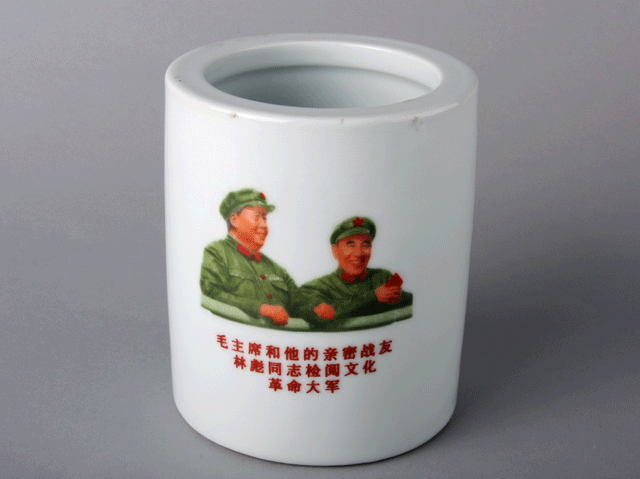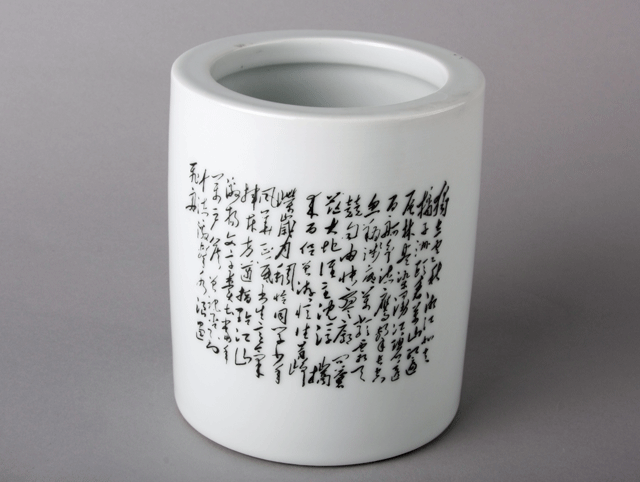
2015.38.1, polychrome brush pot, 1969–1971
Museum purchase; photo by T. Ocken

2015.38.1, polychrome brush pot, 1969–1971
Museum purchase; photo by T. Ocken
Produced during one phase of China's Cultural Revolution, this brush pot shows Mao Zedong and Lin Biao. Someone was very careful about composing the image, making sure that Lin Biao looked shorter than Chairman Mao. Also, Lin Biao is holding a copy of Quotations from Chairman Mao Zedong, better known as the Little Red Book. In part, the image reminds viewers that the Little Red Book was compiled under Lin Biao's direction. The text in red characters indicates that Mao "and his close comrade Lin Biao" are watching a parade celebrating the Cultural Revolution.
Lin Biao became Mao's second-in-command and designated successor in 1969, but died in disgrace in 1971. The official account states that Lin Biao's plane crashed as he attempted to flee the country, following a failed coup. Because of his brief period at the pinnacle of power, Lin Biao's presence on the brush pot allows us to date its production to a two year period.
The brush pot reflects the Cultural Revolution in more ways than one. The
portrait and messages are not hand-painted, but
applied decals. In other words, this is a purely industrial piece.
Not surprising, given the way Mao's Red Guards were then smashing
hand-painted masterpieces that were part of a despised
past. But lest we underestimate 20th century
Chinese culture and society, consider
the back of the pot, shown below.

Photo by T. Ocken
Given the thoroughly political nature of the front of the brush pot, you might
guess that the back provides a strident denunciation of
reactionies, unabashed praise of the Cultural Revolution, or something of
the sort. If so, you'd be guessing wrong. The writing on the back is
Changsha, a poem written by Mao Zedong in 1925. A translation of that
poem follows:
Alone I stand in the autumn cold
On the tip of Orange Island,
The Xiang flowing northward;
I see a thousand hills crimsoned through
By their serried woods deep-dyed,
And a hundred barges vying
Over crystal blue waters.
Eagles cleave the air,
Fish glide under the shallow water;
Under freezing skies a million creatures contend in freedom.
Brooding over this immensity,
I ask, on this bondless land
Who rules over man's destiny?
I was here with a throng of companions,
Vivid yet those crowded months and years.
Young we were, schoolmates,
At life's full flowering;
Filled with student enthusiasm
Boldly we cast all restraints aside.
Pointing to our mountains and rivers,
Setting people afire with our words,
We counted the mighty no more than muck.
Remember still
How, venturing midstream, we struck the waters
And the waves stayed the speeding boats?
The poem can be performed as a song, which you can listen to in this YouTube video. Orange Island in the Xiang River is near Changsha, the capital of Hunan Province, where Mao had been a university student.
See source code for copyright information. Page last revised on February 15, 2016. Please report problems to toh@unm.edu